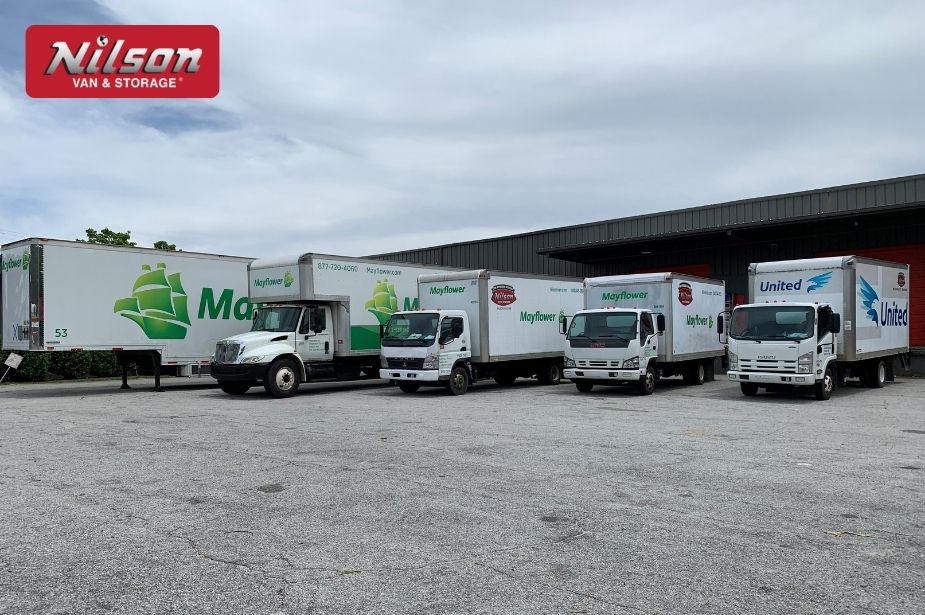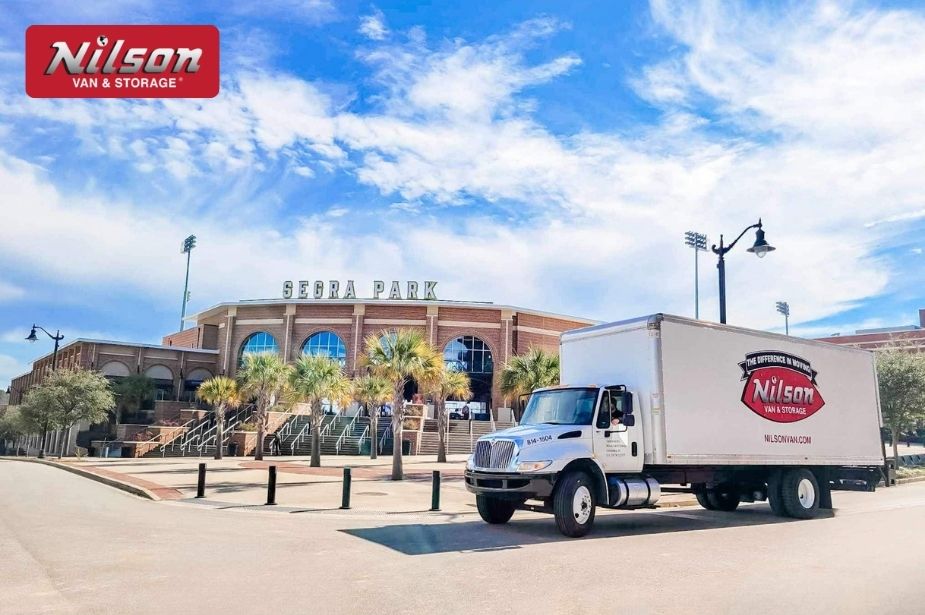
Food Facts: Things to Know Before Moving Food
Moving food is one of those tasks that many overlook until the last minute, only to realize how tricky it can be. When relocating your household, especially within cities like Columbia, Myrtle Beach, Charleston, Sumter, or Savannah, managing your food inventory thoughtfully can prevent unnecessary waste and headache. Unlike other belongings, food requires special attention because it’s perishable, sensitive to temperature changes, and prone to spoilage if handled improperly. Knowing how to pack food for moving and understanding what movers can and cannot transport are key to preserving your groceries, snacks, and pantry essentials throughout the transition.
At Nilson Van and Storage, we recognize these challenges and tailor our moving services to help you navigate the intricacies of moving food smoothly. Our team’s experience with moves in Charleston SC and nearby South Carolina and Georgia areas means we are familiar with the local climate and logistical considerations unique to the region.
We offer flexible moving solutions with no cancellation fees and valuation coverage to give you peace of mind without the stress of binding contracts, especially for local and intrastate moves. Whether you’re moving perishable items or handling non-perishables, the right planning combined with expert support can keep your food safe from spoilage and contamination. This guide will equip you with essential food storage tips and best practices to make sure that your food reaches your new home fresh and ready to enjoy.
Understanding the Basics of Moving Food
Why Moving Food Requires Special Attention
Moving food is not as simple as packing boxes; it demands careful consideration due to its perishability and susceptibility to spoilage. Unlike furniture or electronics, food items—especially perishables—are vulnerable to temperature changes, exposure to air, and bacterial growth during transit. If not properly stored or packed, food can quickly deteriorate, causing not only waste but also potential health risks like foodborne illnesses. For this reason, moving food requires particular attention to safety practices that minimize the time foods spend outside optimal conditions. Whether you’re moving within South Carolina or to nearby Savannah, understanding these risks is crucial for a successful relocation.
Successful moving food strategies always account for the delicate balance between keeping items fresh and managing the logistics of transit. You may be packing frozen goods that require freezing temperatures or fresh produce that needs to avoid crushing and spoilage. Improper handling of these items could result in spoilage, staining, or damage to other belongings. If you’re unsure how to handle specific items, enlisting professional movers Charleston SC families trust, like Nilson Van and Storage, ensures food transport is treated with appropriate care and expertise, preserving quality throughout the move.
Common Types of Food to Consider When Moving
When planning your move, categorizing your food inventory helps in applying the right packing and storage methods. Generally, food items fall into four main categories:
– Perishable Foods: These include dairy, meats, eggs, fresh fruits, and vegetables. They require tight temperature control and rapid transport to prevent spoilage. Moving perishable items often involves refrigeration or using coolers with ice packs to maintain safety during the move.
– Non-Perishable Foods: Dry goods like rice, pasta, cereals, canned goods, and spices fall here. These items are generally stable at room temperature but still need proper packing to avoid damage and contamination.
– Frozen Foods: Items such as frozen meats, seafood, or pre-packaged frozen meals must remain frozen until unpacked. Using dry ice or well-insulated coolers during transit can keep these foods safe.
– Canned and Jarred Goods: Though relatively hardy, these need secure packing to prevent cans or jars from denting or breaking, which could cause spills and potential contamination of other belongings.
Understanding these categories sets the foundation for effective packing food for moving by addressing each group’s unique storage needs.
Legal and Safety Considerations Around Moving Food
When moving food across state lines or even locally within South Carolina and Georgia, certain rules and guidelines govern the transportation of edible goods. Although personal household moves allow for broad flexibility, it’s essential to stay informed to avoid any complications.
For example, transporting meat or dairy products may be subject to regulations concerning temperature control for health reasons. While local moves in South Carolina are typically non-binding, which means you aren’t obligated to specific schedules or fees, adherence to food safety standards is critical to avoid risks.
Additionally, some states have restrictions on importing agricultural products to prevent pests or disease spread. While this mainly affects larger shipments or commercial transport, it’s wise to check for any specific regulations related to your new area, especially when crossing state borders into areas like Savannah.
Working with moving professionals familiar with these regulations, such as Nilson Van and Storage, ensures your food items comply with necessary health and safety guidelines during relocation.
How Nilson Van and Storage Supports Food Moving in Coastal and Inland Areas
Nilson Van and Storage’s moving services are designed to handle the complexities of moving food in both coastal cities like Charleston and Myrtle Beach and inland locations such as Columbia and Sumter. Our team understands the local climate’s impact on your food items, knowing when to recommend quicker transit times or additional insulation measures to combat heat or humidity.
We offer flexible scheduling with no cancellation fees, allowing you to plan your move without pressure. Our valuation protection coverage gives you confidence that your food and belongings are financially safeguarded during the move. For South Carolina residents, our non-binding move agreements mean you get service that’s both reliable and adaptable to your timeline.
While our storage options are secure and well-maintained, it’s important to note storage environments are not specially temperature-controlled, so we advise careful coordination for long-term food storage plans. By combining expert advice on packing food for moving and attentive handling during transport, Nilson Van and Storage ensures your edible items—whether perishable, frozen, or dry—arrive intact and fresh at your new home. Trusting professional movers Charleston SC and surrounding areas rely on means entrusting your food to a team dedicated to delivering care, safety, and efficiency every step of the way.
Moving Food: Essential Tips for Packing Food for Moving and Keeping It Fresh
Planning Your Food Inventory Before the Move
Before you start packing, take a close look at your food inventory to evaluate what you really need to bring along. Moving food without a clear plan often results in unnecessary waste and extra hassle. Begin by sorting through your pantry, fridge, and freezer to identify items that are near expiration or unlikely to survive the move. Consider donating unopened, non-perishable foods to local shelters or food banks in Columbia, Charleston, or Savannah to lighten your load and support your community.
Next, organize the food you plan to keep by grouping similar items together—this will streamline packing and unpacking. For example, keep baking supplies separate from canned goods or frozen foods. Reducing your food stash also means fewer coolers and insulation materials, which can cut down overall moving costs. This strategic approach ensures that packing food for moving stays efficient without compromising freshness or safety.
Packing Food for Moving: Step-by-Step Guide
Packing food for moving takes more than tossing groceries into boxes; it requires the right containers and methods to maintain quality during transit. Start with using sturdy, sealable containers to prevent leaks and contamination. For dry foods, airtight plastic bins or heavy-duty boxes lined with plastic bags work well to keep moisture and pests out. For liquid items like oils or sauces, use sealable jars or bottles and wrap them in bubble wrap to guard against spills.
Labeling is just as important as packing. Clearly mark each container with its contents and whether it needs refrigeration upon arrival. This practice simplifies unpacking and helps you prioritize which foods to handle first at your new home.
When packing perishables, insulation is critical. Use coolers with ice packs or gel packs, and wrap foods in thermal blankets or insulated bags to keep temperatures steady. For frozen items, dry ice can extend the frozen state during longer moves. Packing perishables carefully reduces spoilage risks significantly.
Food Storage Tips During Transit
Maintaining food safety during transit hinges on temperature control. Even short trips without proper cooling can compromise perishables. Portable coolers equipped with quality ice packs are essential for preserving dairy, meats, and fresh produce. For moves lasting several hours or longer, layering ice packs and dry ice can help maintain consistently low temperatures.
Keep cooler boxes in an easily accessible area of the moving van so you can check or replace ice packs if needed. Avoid opening coolers unnecessarily to prevent warm air from entering. For non-perishable items, store them separately in dry, clean boxes to protect from moisture or leakage.
Following these food storage tips during transit helps prevent foodborne illnesses and keeps your move efficient and worry-free.
Can Movers Take Food? What to Expect from Professional Moving Services
Many people ask, “Can movers take food?” At Nilson Van and Storage, the answer is yes, with some important guidelines. Our professional movers Charleston SC residents trust are equipped to transport food safely, but it’s important to discuss your food items during the booking process. We recommend packing perishable items yourself using recommended insulation methods due to liability and food safety concerns.
Nilson Van and Storage offers moving services with valuation protection—not traditional insurance—which means your food and belongings are financially covered during the move under our clearly defined terms. Furthermore, South Carolina’s moves are non-binding for local customers, providing flexibility and no cancellation fees so you can adapt your plans as needed.
By communicating your moving food needs in advance, our team can tailor the loading, route planning, and timing to minimize exposure to heat and delays—especially crucial in warm climates like Charleston and Myrtle Beach.
Special Considerations When Moving Perishable Items
Moving perishable items requires meticulous timing and preparation. Ideally, plan your move to minimize the time perishables spend outside refrigeration. Pack fresh meats, dairy, and cut fruits last, and unpack them first at your new location to return them swiftly to cooling units.
If your move spans multiple days or involves storage, avoid packing perishables in storage units. While Nilson Van and Storage provides secure storage options, these facilities are intended for longer-term household goods, not temperature-sensitive items.
To maximize freshness, consume or freeze perishables well before your move date. When packing, avoid overcrowding coolers and use airtight packaging to limit exposure to air. Finally, have a cooler or refrigerator ready at your destination to unload perishables immediately.
Combining these strategies with expert moving services ensures your perishable foods arrive fresh, helping your relocation to Columbia, Savannah, or anywhere in South Carolina go smoothly and stress-free.
Read also: Top Moving Mistakes You Don’t Want to Make
How to Pack Specific Food Categories Safely for a Move
Non-Perishable Foods
When moving food items that don’t require refrigeration—such as canned goods, dried pasta, rice, cereals, and sealed snack products—proper packing can mean the difference between intact groceries and a messy cleanup. Start by using sturdy boxes that can support the weight of heavy canned goods without breaking. Avoid overpacking boxes to prevent crushing contents at the bottom. To protect fragile packaging, wrap items individually or separate layers with packing paper or bubble wrap. Seal cans tightly to prevent leaks, and move open boxes of dry goods into airtight containers or resealable bags to safeguard against spills and pests.
Label your boxes clearly to facilitate unpacking and keep food organized by categories like baking supplies, canned vegetables, and dry snacks. Nilson Van and Storage’s expert movers Charleston SC customers count on can help organize these boxes carefully in the moving truck to minimize shifting during transit and protect your food’s integrity.
Fresh Produce and Fruits
Fresh fruits and vegetables are notoriously delicate and require extra care when moving food. Preventing bruising and spoilage starts with selecting produce that’s ripe but firm and not overly delicate. Avoid packing soft fruits that bruise easily, such as peaches or berries, if your move involves long travel times.
Use shallow, ventilated containers or produce baskets to allow airflow, which helps prevent moisture buildup and mold during transit. Layer produce with soft packing materials like paper towels or cloth to keep items from pressing against each other. For leafy greens and herbs, keep them lightly wrapped in damp paper towels inside breathable bags to maintain freshness without excess moisture.
Timing your move is crucial for fresh produce. Try to transport these items last and consume them promptly after arriving. Nilson Van and Storage understands the subtleties of moving perishable items in coastal areas like Myrtle Beach and Charleston, offering packing recommendations tailored to local conditions.
Frozen Foods
Frozen foods demand special packing strategies during moving food to maintain safe temperatures and prevent thawing. Prioritize using high-quality insulated coolers or Styrofoam boxes that can retain cold temperatures for extended periods. Supplement with dry ice packets or gel ice packs depending on the length of your move—dry ice lasts longer but requires extra safety precautions.
Freeze items solid at least 24 hours before packing to create a buffer against warming. Pack frozen foods tightly together in coolers to maintain a solid frozen mass, reducing exposure to warm air. Clearly mark coolers “Frozen Foods — Open First” so unpacking happens quickly, ensuring frozen goods return to refrigeration without delay.
Keep in mind that moving during cooler months may reduce the challenge of temperature control, but in warm climates like Savannah or Sumter, extra caution with packing materials and expedited transport is essential. Nilson Van and Storage’s knowledgeable movers Charleston SC area customers rely on will advise on optimal timing and packaging for frozen goods.
Baked Goods and Homemade Items
Baked goods and homemade dishes are prone to damage from crushing or moisture changes during a move. Pack cakes, cookies, and breads in rigid containers or dedicated bakery boxes to prevent squashing. Use layers of parchment paper or wax paper between items to keep pieces separated, especially for cookies or flaky pastries.
For soft, creamy, or frosted items, refrigeration is key. Plan to transport these items in coolers with ice packs, and avoid stacking heavy boxes on top. For homemade items like casseroles or salads, secure lids tightly and consider wrapping containers in plastic wrap to avoid leaks.
Moving food with homemade dishes requires attention to temperature as well as fragility. Nilson Van and Storage prioritizes careful handling and transport, reflecting the same level of diligence whether you’re moving within Columbia, Myrtle Beach, or out to Savannah.
Specialty Items & Dietary Needs
Specialty food items such as baby formula, gluten-free products, frozen meats, or allergy-friendly foods require extra precaution. Since these are often vital for health and lifestyle, packing food for moving in this category calls for airtight, labeled containers with clear directions for handling.
Baby formula, for instance, should never be exposed to extreme temperatures and must be unpacked and refrigerated immediately after arrival. Frozen meats demanding uninterrupted freezing also benefit from insulated packaging combined with dry ice, especially for cross-state moves.
Gluten-free and allergy-sensitive foods should be kept separate from other pantry items to avoid cross-contamination during the move. Nilson Van and Storage is well-versed in accommodating these special requirements, offering flexible, non-binding move options with no cancellation fees to ease the stress of transporting dietary sensitive items safely.
By addressing these specifics for each food category, you can safeguard your culinary essentials and ensure a smoother transition to your new home in Charleston, Columbia, Myrtle Beach, Sumter, or Savannah. Trusting experienced movers like Nilson Van and Storage helps turn the challenge of moving food into a manageable, even seamless, part of your relocation experience.
Storage Solutions and Tips for Moving Food Long-Term
Temporary Storage Options Between Moves
Sometimes, moving food means you’ll need a storage solution between your current home and your new one. Temporary storage is a helpful option if your timing doesn’t align perfectly or if you’re downsizing gradually. When considering storage, many think about climate-controlled units first; these units maintain steady temperature and humidity levels, which can be critical for food safety and shelf stability—especially in the humid and warm climates of Columbia, Myrtle Beach, or Savannah.
However, climate-controlled units can come at a premium, and not all food items require this level of care. Traditional storage units, while often more affordable, do expose your food supplies to temperature swings that can trigger spoilage, especially with perishable or frozen items. Because of this, it’s best to minimize how long you store food and focus storage on non-perishables that withstand fluctuations, like canned and dry goods.
Nilson Van and Storage offers secure storage facilities conveniently located to serve the coastal and inland areas we cover. While our storage units are secure and monitored for safety, they are designed primarily for household goods rather than temperature-sensitive items. For moves involving food storage, we recommend careful planning and short-term use of storage, reinforcing that perishables should either be consumed before moving or transported directly without extended storage.
Food Storage Tips to Extend Freshness Post-Move
Upon arriving at your new home, proper food storage becomes critical to maintain freshness and avoid unnecessary waste. Start by reorganizing your pantry intelligently: group canned goods, dry foods, spices, and baking supplies in clearly labeled sections to simplify meal prep and inventory management. Keep older items front and center to use them first and prevent expiration.
Refrigeration is equally important. Make sure your fridge and freezer are clean and operating efficiently before unpacking perishable and frozen items. Arrange these foods to allow air circulation, which helps maintain consistent temperatures and prevents hotspots that accelerate spoilage. Consider investing in organizational bins or shelf liners specifically designed for pantry and fridge to keep things tidy and prevent cross-contamination.
If you’re moving into a climate or region with different seasonal temperatures—say, relocating from Savannah’s humid coast to Columbia’s inland climate—adjust your food storage techniques accordingly. This might mean controlling humidity in pantry spaces or monitoring refrigerator settings more frequently. Following these food storage tips will help preserve your groceries longer and ease your transition into your new kitchen.
Using Nilson Van and Storage’s Secure Storage Facilities
When storage is necessary during your move, Nilson Van and Storage provides dependable, secure facilities that support your logistics across South Carolina and Georgia, including Columbia, Myrtle Beach, and Savannah. Our storage units offer robust safety features such as 24/7 surveillance and controlled access, giving you confidence that your belongings remain protected.
Though our storage is tailored for general household goods and not specifically equipped for temperature-sensitive foods, we focus on flexibility and convenience for your moving timeline. Plus, we adhere to customer-friendly policies like no cancellation fees, valuation coverage for added protection, and non-binding moves for local South Carolina customers, ensuring that you retain control and peace of mind during your move.
By combining smart food storage strategies with Nilson Van and Storage’s reliable moving and storage services, you can effectively manage the complexities of moving food long-term. This approach provides a seamless transition, whether you’re relocating within or between the vibrant communities of Charleston SC, Sumter, or beyond.
Avoiding Common Mistakes When Moving Food
Overpacking or Underestimating Food Needs
One of the biggest pitfalls in moving food is misjudging how much to bring along. Overpacking leads to unnecessary weight, higher moving costs, and increased risk of spoilage if items remain uneaten after the move. Underestimating your needs, on the other hand, can result in frequent, inconvenient trips to the grocery store or reliance on expensive takeout during a stressful transition.
To strike the right balance, start by conducting a thorough inventory of your food supplies well ahead of moving day. Use this time to consume perishables, donate unwanted goods, and plan meals around what you intend to keep. This approach not only saves money but reduces waste and streamlines packing food for moving. Nilson Van and Storage encourages thoughtful management of your food stash because less clutter simplifies the move and ensures fresher food upon arrival.
Ignoring Expiration Dates and Safety Guidelines
Moving food without checking expiration dates and safety standards is a costly mistake that risks your health and convenience. Expired or near-expiration items are more susceptible to spoilage during transit, especially if packing or temperature control falls short. Consuming spoiled food can cause serious foodborne illness, turning an already stressful move into a health hazard.
Always inspect your food items carefully prior to packing, discarding anything expired or questionable. Pay special attention to perishable and frozen goods, which require strict temperature control and fast transit. Strict adherence to food safety guidelines during moving protects both your health and your investment in groceries. Professional movers Charleston SC trusts, like Nilson Van and Storage, can offer advice and flexible services that accommodate your timing and preservation needs.
Inadequate Labeling and Poor Organization
Packing food without clear labels and organization creates chaos at unpacking time. Boxes and containers that aren’t labeled “perishable,” “fragile,” or “open first” can lead to delays in retrieving critical items like refrigerated goods, increasing the risk of spoilage.
Develop a labeling system that includes contents, handling instructions, and priority level. Organize food by type—dry goods separate from frozen items, for example—and pack accordingly. This system enables you or your movers to unpack efficiently and prioritize refrigerated or frozen foods immediately upon arrival. Nilson Van and Storage values clear communication and organization, helping streamline the entire moving food process from packing to settling in.
Not Coordinating with Movers About Food Items
A common oversight is failing to inform your moving company about food transportation needs. Asking “can movers take food?” early on is crucial, especially for movers Charleston SC residents rely on, like Nilson Van and Storage. This ensures your chosen movers can advise on policies, restrictions, and best packing practices specific to your circumstances.
Coordinating food transport with your movers allows them to plan loading sequences that protect fragile or perishable items and optimize transit time. With Nilson Van and Storage’s no cancellation fees, valuation protection, and non-binding move options for South Carolina locals, you have flexibility and reassurance. Open communication prevents surprises and supports careful handling of your food, helping your relocation go smoothly and safely.
Wrapping Up
Moving food successfully demands thoughtful preparation and experienced handling to ensure freshness and safety throughout your journey. Whether you’re relocating locally within Columbia, Myrtle Beach, Charleston, Sumter, or Savannah, Nilson Van and Storage provides professional moving services customized to your specific needs. Our team understands the nuances of packing food for moving, managing moving perishable items carefully, and navigating local regulations affecting food transport.
With our no cancellation fees and valuation protection that offers peace of mind—not traditional insurance—we make your move as flexible and worry-free as possible. For South Carolina locals, our non-binding moves guarantee you control over your schedule without penalty. Relying on seasoned movers Charleston SC trusts means your food receives expert care and that your entire relocation proceeds smoothly.
Use the food facts and tips shared here as a roadmap for your move. From inventory planning and proper packing methods to strategic communication with your moving company, these practices protect your edible items from spoilage and waste. Trust Nilson Van and Storage to deliver reliable, professional assistance that preserves the quality of your food and makes your transition to a new home seamless and stress-free.
FAQs
Can I move food with professional movers in Charleston SC and surrounding areas?
Yes, professional movers in Charleston SC and nearby areas, including Nilson Van and Storage, can transport food safely. However, it’s important to discuss your food items with your moving company ahead of time. Movers typically recommend that customers pack perishable items themselves using appropriate insulation, while non-perishables can be securely packed and moved by the team. Communicating your moving food needs ensures proper handling and timing to maintain freshness.
What are the best materials for packing food during a move?
The best materials for packing food depend on the type of items. Sturdy, airtight plastic containers and sealable bins are excellent for dry goods and canned products to prevent leaks and contamination. For perishable items, insulated coolers combined with ice packs or dry ice help maintain safe temperatures. Bubble wrap or packing paper is useful for protecting fragile jars and bottles. Labeling containers clearly also makes unpacking more efficient.
How should I store perishable food items while moving?
Perishable foods require constant temperature control to prevent spoilage. Use high-quality insulated coolers filled with ice packs or dry ice for longer moves. Pack perishables in airtight packaging to reduce exposure to air and bacteria. It’s advisable to transport perishable items yourself when possible to monitor temperature, but if moving with professionals like Nilson Van and Storage, coordinate timing to minimize transit duration and ensure prompt refrigeration upon arrival.
Are there restrictions on the types of food movers can transport?
While movers generally can transport most household food items, certain regulations or company policies may restrict specific foods, especially perishable items that require refrigeration or frozen goods needing continuous cold storage. Agricultural controls may also apply when crossing state lines. Nilson Van and Storage advises customers on any local or regional restrictions, ensuring compliance during the move within South Carolina and Georgia.
How far in advance should I plan to move my frozen foods?
Frozen foods should be solidly frozen before packing—at least 24 hours in advance—to maximize time spent frozen during transport. Plan your move so that frozen goods spend the shortest possible time outside a freezer or cooler. Coordinate with your movers to schedule an efficient move day. Use dry ice or high-quality gel packs to extend freezing times if your move involves longer distances or delays.
Can Nilson Van and Storage provide temporary food storage solutions?
Nilson Van and Storage offers secure storage facilities located in Columbia, Myrtle Beach, and Savannah. While these units provide excellent protection for general belongings, they are not tailored for temperature-sensitive food storage. For this reason, we recommend minimizing food storage duration or consuming perishables before storing. Our storage options complement our moving services with policies like no cancellation fees and non-binding moves for South Carolina locals, giving you flexibility.
What should I avoid packing when moving food?
Avoid packing spoiled, expired, or opened perishable foods that won’t last through the move. Highly fragile items prone to spills should be securely packed or consumed beforehand. Items requiring constant refrigeration, like certain dairy or frozen goods, should be moved with care—or consumed before the move if storage or transit may compromise safety. Open containers and bulky liquids also present risks and are best avoided.
How do movers protect food from spoilage during long-distance moves?
Professional movers like Nilson Van and Storage manage moving perishable items by coordinating optimal loading sequences and minimizing transit times. While movers typically do not take responsibility for food refrigeration, they can accommodate insulated packaging and advise on packing methods that maintain freshness. Communicating with your movers ensures specially handled foods are prioritized for prompt unloading and refrigeration upon arrival, reducing spoilage risk.

FAQs - Moving Food
Our Recent Articles
Stay informed and inspired with the latest tips, insights, and updates from the Nilson Van and Storage blog. From expert packing advice and moving checklists to stories about our commitment to the community, our articles are here to make your relocation journey smoother and stress-free. Explore our recent posts to discover how we’re redefining the moving experience for Columbia, Myrtle Beach, Charleston, Sumter, Savannah, and beyond.

Moving Company in Columbia SC: Experts for Your Relocation

Expert FF&E Logistics Solutions for the Hospitality Industry

